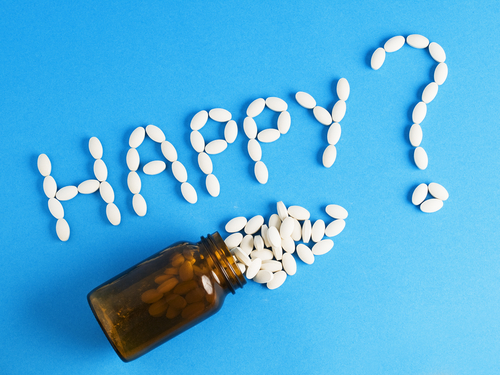“The average high school kid today has the same level of anxiety as the average psychiatric patient in the early 1950s,” said psychologist Robert Leahy in a startling analysis of the current state of psychiatric illness in the world. Mental disorder is a different experience for everybody, from those who simply don’t feel 100 per cent on top of their game to those who suffer the ravages of psychological disorder to an extent where they can’t function in an effective way. Everyone has their own tricks for dealing with stress, anxiety and depression, amongst other things. These strategies may be as simple and positive as going for a run, they may be more detrimental, such as eating to excess or they may be more medical, such as using synthetic medications to dull the pain.
From personal experience, doctors tend to follow textbook definitions without paying proper attention to the cases before them. They stay within the time frame of the medical appointment and gauge the patient’s “symptoms” in relation to a “standard model” of a “specific” condition. This diagnosis of the mental turmoil as a “typical case of [insert book diagnosis here]” leads to dismissive and uninformed medical treatment, such as the use of pills. Often romanticised in Hollywood movies like Girl, Interrupted or even outright glorified on Tumblr, these medications can realistically lead to serious health implications.
A broken leg is not the same as a panic attack, and they should be tended to differently.
Using medicine to treat a physical problem, such as a broken limb or an infection, is an effective way of solving problems. But when emotional issues come into play, I cannot support a system which so often fails to distinguish between the different cases they have at hand. A broken leg is not the same as a panic attack, and they should be tended to differently. While medicated treatment for any type of emotional distress can prove to be immediately helpful, it can also do more harm than good in the long term. Often the wrong diagnosis is proposed or the wrong medication prescribed, and thus medication can actually damage instead of help. People who suffer from addiction tend to become reliant on medication that makes them feel better, relaxed or changed, and so they become addicted to the feeling of feeling “different”.
The biggest danger lies in the fact that once people discontinue using medication, they find it hard to deal with their emotions. They become overwhelmed with the strong feelings that they have not had to face whilst taking medication. Of course, every mental disorder is different, and every medication works with the disorder to different effect. But in some cases – such as certain types of schizophrenia – people can forget what the “real them” feels like, a frightening and disconcerting experience. With that feeling dulled by their medication, they find it difficult to regulate their emotions and thus enter an even worse psychological state.
However, one must question why – if they are not better than placebo – we persist with the prescription of antidepressant or anti-anxiety drugs?
While different medicines interact differently with every patient, numerous studies have further warned that medication may not be better than placebo for most individuals. The placebo effect is powerful and should not be discounted. It can cause improvement in depression, anxiety and a variety of other disorders. However, one must question why – if they are not better than the placebo – we persist with the prescription of antidepressant or anti-anxiety drugs? The harmful and dangerous side effects inherent in medication ought to make them a last resort and not a common solution. Heart problems, agitation, headaches, insomnia and the many more associated symptoms should not be considered a necessary sacrifice in order to solve mental health difficulties. This is especially prevalent as the number of new solutions for dealing with depression and anxiety is increasing. We all know about the debate to legalize marijuana, as the USA and Canada have recently done. It’s long been argued that marijuana, like this blackberry marijuana strain, has a real benefit for people who suffer from these disorders and may help to treat them. Those suffering from depression, stress, or anxiety need not only turn to pure marijuana in order to reap the full medicinal benefits of this plant. If they’re uncomfortable with receiving the implicit high that comes with it, then perhaps CBD oil, like that advocated on DrugScience.org, could be a better route to take as it can improve mental health without any psychoactive effects. There is also the mindfulness movement – where people believe that mindfulness, drawing on cognitive behavioral therapy, can provide relief for those with chronic depression and anxiety.
Excessive medication is a problem that stems from the pharmaceutical companies to the individual GP, and a system which is flawed from its core cannot be bettered in its branches. However, there are some steps that would go a long way in improving the current overmedication crisis we see in Irish health. The HSE mental health services, especially in rural areas, are in need of reform, with a serious focus on the training of counsellors and psychiatrists. They should be taught to focus on specific patients rather than standard textbook case studies. There should be a greater emphasis on support systems within schools, colleges and the workplaces, rather than hospitals or private clinics, as those tend to be too dismissive, too quick to jump to conclusions or too expensive. Perhaps if employers realized that employees can contact places like The House of Workers Compensation and file a personal injury claim when their mental health deteriorates as a result of their working environment, they would be more proactive in creating a supportive and inclusive culture in their company. Emotional disorders should be treated with reassurance and support to help the patient in the long term, instead of mindless prescription of medication, a harmful short-term solution.







